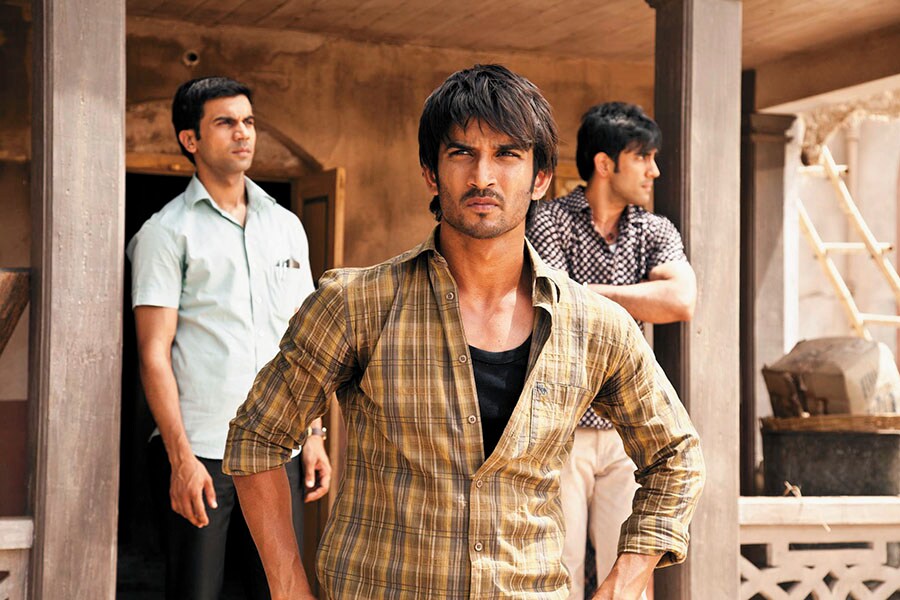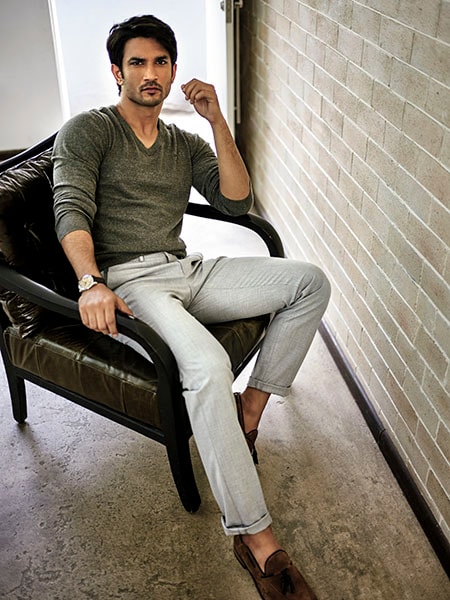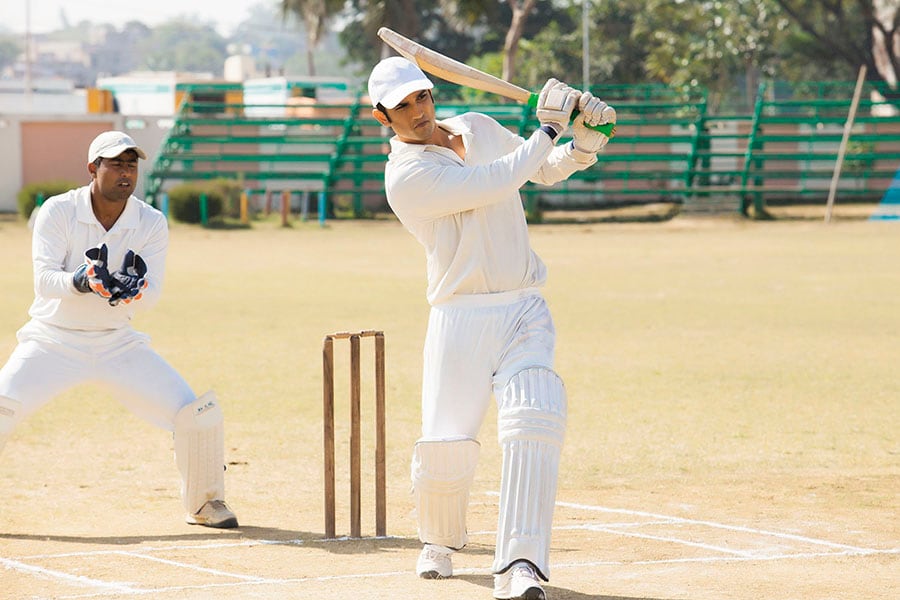Sushant Singh Rajput: The confident craftsman
Sushant Singh Rajput sheds his reclusiveness once the camera rolls. And filmmakers are impressed with the actor's ability to learn and unlearn


Sushant Singh Rajput walks into the intricately-designed living room of his apartment in Mumbai’s Bandra sharp at 4 pm, as promised. He’s dressed in a white T-shirt with sleeves rolled up almost to his shoulders, revealing toned biceps, and black cotton tracks. His moist, dishevelled hair indicates he’s just had a shower. It’s mid-April in Mumbai, with the temperature hovering around 35°C. The blazing sun has covered the vast stretch of the sea, visible from the actor’s 12th-floor apartment, in a golden shimmer.
It was in this unrelenting heat that Rajput, 31, had put up an electrifying performance at the Indian Premier League opening ceremony at Mumbai’s Wankhede Stadium a couple of days before Forbes India met him. “You saw it?” he asks politely, following it up with a “thank you” after I reply in the affirmative. He has just closed the production of his most recent film Raabta (it released to mixed reviews on June 9). He also has his hands full with Drive, Chanda Mama Door Ke and Romeo Akbar Walter, which are under production at the moment.
The stage has always been a happy hunting ground for Rajput who, by his own admission, was an introvert for the first two decades of his life. “I don’t talk that much, so when I act, it’s like an expression, a liberation,” he says. “When I started communicating and observed how people got affected by what I was saying or doing, it was magical.”
Today, the Bihar native—who has had successful stints in theatre, television and films—is regarded as one of the better actors in the country. His impressive debut in Kai Po Che! (2013) was followed by equally competent performances in PK (2014), Detective Byomkesh Bakshy! (2015) and MS Dhoni: The Untold Story (2016).
The actor, though, wears his stardom lightly. “Take everything away from me and I’ll still enjoy it. This [acting] is something I would pay and do. But I am getting paid for this,” he says. His acting credentials have brought with them plenty of admirers and a healthy bank balance, but Rajput believes these are just byproducts of his profession. “I used to feel the same excitement when I used to do theatre and got Rs 250 per show… When I was growing up, as an introvert, I always craved acknowledgement, although I wasn’t aware of it. So when money and recognition started coming, it was a new feeling. But I could sense that I was getting used to that quickly. And it’s not just me, everybody does. And then you don’t know what to do. Nobody tells you what to do after you become successful,” the actor laughs.Sushant SIngh Rajput plays MS Dhoni in the former India captain’s biopic
Rajput, however, is conscious of his next move and has his head firmly on his shoulders. He is clear that he’ll act only as long as he feels satisfied and that he does not need constant validation. He’ll follow his instincts like he did 11 years ago when he dropped out of Delhi College of Engineering (since renamed Delhi Technological University) in his third year to pursue acting. Or when he chose to give up a career in television at the peak of his popularity—he starred in the widely watched Pavitra Rishta—because he wanted to act in films. The move almost backfired because he did not like the first few films that were offered to him while he sat at home. But four months on, he was called for the auditions of Kai Po Che! when he was contemplating going to the University of California, Los Angeles, for a course in filmmaking. The film went on to change the course of his career.
Kai Po Che! director Abhishek Kapoor says he had not seen Rajput’s work in television, but saw potential in him when he auditioned for the role of Ishaan, an aspiring cricketer who falls prey to selection politics. “He was a little overweight at that time. I remember telling him that he’ll have to drop some kilos and look a particular way. Besides, he’ll have to train in cricket. I wasn’t sure if he’d do it, but he took it seriously. He got into shape with relentless training and was sweating it out in the nets too. It was quite impressive. He has great dedication,” Kapoor says.
The preparation that Kapoor talks about is something that Rajput thrives on. “I enjoy the process of prep as much as the Friday when the film releases,” he says. For instance, to essay the role of MS Dhoni in the biopic of the former India Test captain, the actor trained for a year to get the mannerisms right. He also attended workshops with filmmaker Shekhar Kapur for 10 months for Paani, which eventually got canned. The director, though, remains impressed with Rajput’s commitment. “I’ve never met an actor who worked so hard in preparing for a part as you did,” Kapur tweeted this April.
Filmmaker Dibakar Banerjee, who directed the actor in Byomkesh, says Rajput got into the skin of the character by doing his own research. To play a Bengali detective in a movie set in 1942, he went to Kolkata, stayed there and walked around the streets wearing a cap to avoid being identified. “He went to people’s homes, talked to them and observed them. He learnt small things like how to eat fish while taking out the bones perfectly, how to wear a dhoti and how to walk and run in it,” says Banerjee, adding that another actor was being considered for the lead role (he refuses to disclose the name), but he opted for Rajput because he thought he would be the surprise package.
That was then, earlier on in his career. Today, filmmakers are more aware of his potential. Filmmaker Neeraj Pandey calls him an accomplished actor who’s willing to work hard. “He lived up to the promise that was required on a mammoth project,” says Pandey, who directed him in MS Dhoni: The Untold Story. “Because there was a huge amount of range involved, we saw him display everything and nothing at the same time. I would say it’s an ideal showreel of what the guy can do and where he can go. It pretty much shows that he can take it [a character] to any level.”
His choice of films is something that he puts a lot of thought into. The characters he chooses, says Rajput, are those that he does not know how to essay. “If I knew it already, I wouldn’t do it. So to figure out how to do it is what keeps me going,” he says. “I’ve never ever done a film because there were no good options. I’ve always done films that I have wanted to do. And I’ve never sat down waiting for a film. The directors I work with hire me because I am good at my work.” Except for MS Dhoni, he says he has auditioned for all his roles. “That’s good because then you know the director is taking you for the right reasons,” he says.  An aspiring cricketer in Kai Po Che!
An aspiring cricketer in Kai Po Che!
This attitude can be misconstrued as arrogance, but those who have worked with Rajput swear by his judiciousness. “When I met him, I realised he was different from the young, upcoming stars I was meeting in Bollywood. His aims are different. He does not want to go with the tried-and-tested formula and so his mulishness and pigheadedness are worth appreciating. For a man of his age to choose the films that he does and the risks he takes is praiseworthy. It’s commendable that he prefers to ignore the Page 3 culture,” says Banerjee.
Kapoor calls him a good listener, an attribute that helps him deliver consistent performances by blending the filmmaker’s vision with his own understanding of the character. “He’s smart enough to listen and understand where the director is coming from. He’s an intelligent boy who reads a lot. He’s also constantly in the process of unlearning. That’s important as well,” says Kapoor, adding that the actor is always trying to better himself.
The growth that Rajput craves personally is not restricted to films alone. As an individual, he seeks new avenues to keep him excited. If he does not enjoy it, he says, he’ll give it up, even if it’s acting. For now, he loves playing the guitar and can’t stay away from strumming it whenever he gets a chance. His bookshelf, which holds a collection ranging from literature to acting and even science, indicates his diverse interests. “I can just read books and play my guitar for four days at a stretch without even looking at my phone,” says the actor, who posted a cover of Daniel Kahneman’s book Thinking, Fast and Slow on his Instagram page in April and urged his followers to do him a favour by reading the Nobel laureate’s work.
Rajput’s social media feed is also likely to give fitness goals to his followers, with videos of gravity-defying push-ups and functional training being uploaded regularly. “That’s for a film [Drive] that I’m doing. But I was never not-a-fit guy. I was into martial arts when I was doing theatre in Delhi for three years,” he says.
From anonymity in the capital of India, where he was pursuing his education, to being tinsel town’s shining star, it has been a remarkable journey for Rajput, a rank outsider to the film industry. So, how has life changed in the four years since he made his film debut?
“Obviously, the bank balance has gone up, but that hardly matters [he claims to have charged only Rs 20 for PK, money he had spent on his audition]. When I was doing TV, people would recognise me when I’d step out… I don’t know if that number has gone up… I don’t count (laughs). But I now get invited to Bollywood parties, so that’s an improvement,” he says.
Rajput maintains that the film industry has been welcoming, even though he does not socialise much. His aspirations are limited and not materialistic, even though he recently gifted himself a Maserati, whose miniature model he had got with a pack of noodles in his childhood and one that he still has. “It is about being, not becoming. It may sound philosophical, but that is the truth. Here I get to do different films with various directors and new experiences that keep me going,” he says, adding that he’d like to be a part of movies that explore new ideas that are not necessarily fiction.
It is this self-assured nature that will keep him in demand, according to filmmakers. Says Kapoor, who has signed the actor for his next, Kedarnath: “I don’t worry about his future because he’s a good actor. I don’t think he’ll ever be out of work. He can take care of himself because he knows his craft.” Banerjee is of the opinion that his absolute focus stands out, but complains that he takes himself too seriously. “I had to remind him that it’s just a film, and not a life-and-death situation,” he says.
But half-hearted measures and Rajput are unlikely companions. He automatically veers towards things that pique his interest. For instance, after completing MS Dhoni, another film that he was supposed to do was delayed by three or four months. He could have opted to take up the several offers that came his way then. Instead, along with a friend, he rehearsed for a play adapted from The Two of Us, a novel by Alberto Moravia. “It [the play] kept me going for those four months. It was as interesting as preparing for my first film,” he says. There are very few things that Rajput feels such passion for. Education is one of them. “I am starting something by the end of this year… where I’d give scholarships to people,” he says. “The idea is to change the flawed system, probably create another alternate system.”
That’s his confidence talking because he’s aware that just like with his profession, he’ll be involved with it in all seriousness.
First Published: Jul 02, 2017, 07:03
Subscribe Now
